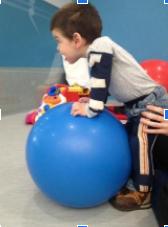Bobath NDT is designed to work with children who have Cerebral Palsy (CP), which is a group of disorders that affect a child’s ability to move and maintain balance and posture. CP is the most common motor disability in childhood. Cerebral means involving the brain; Palsy means weakness or difficulties using a child’s muscles.
Julie is a Bobath trained NDT therapist and has spent a number of years working with children with Cerebral Palsy. Bobath therapy involves an in-depth clinical assessment of a child’s movement patterns and the quality of their movement based on experience. This intervention looks at the specific reasons preventing your child doing what they want to do and identify other issues you may be unaware of. Therapeutic intervention will address a child’s postural tone, joint mobility and proximal stability. These areas are addressed initially in therapy sessions and are then linked to helping children to improve their independence in activities of daily living such as getting dressed, holding a spoon and brushing their teeth.
Play forms an important and essential part of Bobath therapy. Sessions are fun and our therapy rooms are full with toys, swings and games. Family/carers are asked to sit in on each therapy session so that they have the opportunity to learn techniques and strategies to use at home. Julie can also give you practical advice on adapted equipment and mobility aids.

